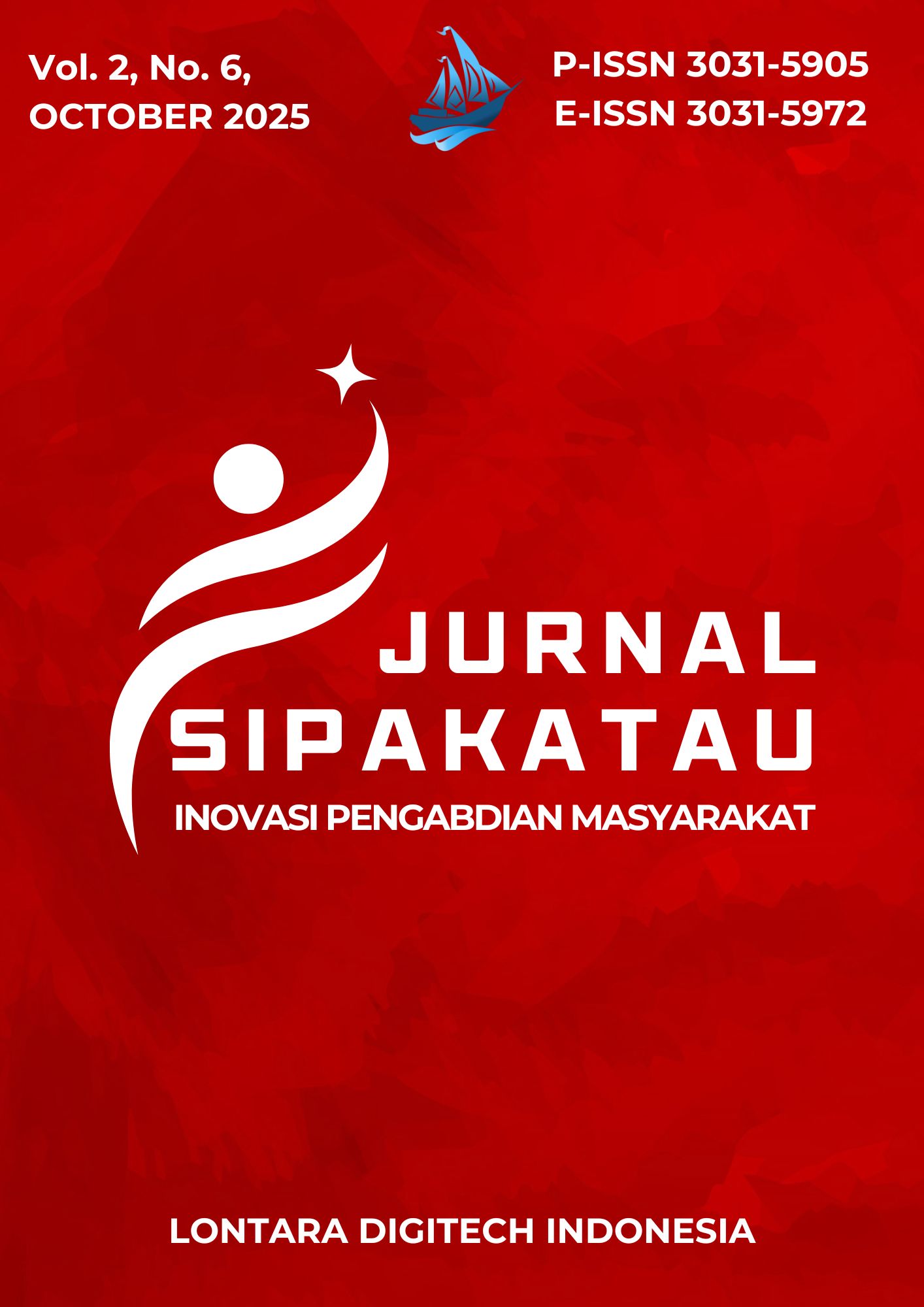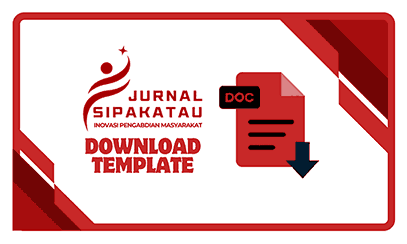Legal, Social and Health Literacy Improvement Program for Adolescents through Community Education
DOI:
https://doi.org/10.61220/jsipakatau.v2i6.2538Keywords:
legal literacy, community-based education, adolescent health, child forumAbstract
This community engagement program aims to enhance adolescents’ literacy in legal, social, and health aspects through a participatory community-based education approach. The main partner of this program is the Ambon City Child Forum, which serves as an advocacy platform for youth involvement in local child-friendly city initiatives. The program was implemented in July 2025 in Ambon City, involving 30 adolescent participants who are active members of the forum. The implementation utilized interactive learning methods including participatory lectures, group discussions, case simulations, and role plays designed to address issues related to legal protection, social interaction, and reproductive health among adolescents.The results demonstrate a significant improvement in both knowledge and attitudes among participants. The average score increased from 52.3 (pre-test) to 85.7 (post-test), indicating a 33.4-point improvement after the intervention. Furthermore, 70% of participants reported greater confidence in reporting cases of violence, while 75% became more open to discussing reproductive health issues. The program also established the Child Forum Literacy Working Group, which focuses on continuing peer education activities in schools and surrounding communities. This initiative not only improved adolescents’ multidimensional literacy but also strengthened the role of the Ambon City Child Forum as a peer education and advocacy agent at the local level. Moreover, the program contributes directly to the achievement of several Sustainable Development Goals (SDGs )notably Goals 3, 4, 5, and 16 by fostering a generation of youth who are legally aware, socially empathetic, and physically as well as mentally healthy.
References
Ainsworth, H., & De Figueiredo, T. (2022). Education-health partnerships for youth empowerment: Lessons from community-based literacy programs. Health Education Research, 37(5), 654–667. https://doi.org/10.1093/her/cyac023
Andayani, P., Sari, N., & Mulyana, R. (2023). Strengthening child forums as local instruments for child protection policy implementation in Indonesia. Children and Youth Services Review, 153, 107187. https://doi.org/10.1016/j.childyouth.2023.107187
BPS. (2022). Statistik Pemuda Indonesia.
Brinsley, J., et al. (2025). Effectiveness of peer-led lifestyle interventions on adolescent mental health outcomes: A systematic review. Frontiers in Psychology, 16, 1412137. https://doi.org/10.3389/fpsyg.2025.1412137
Brinsley, J., et al. (2025). Effectiveness of peer-led lifestyle interventions on adolescent mental health outcomes: A systematic review. Frontiers in Psychology, 16, 1412137. https://doi.org/10.3389/fpsyg.2025.1412137
Campbell, R., Starkey, F., Holliday, J., Audrey, S., & Moore, L. (2021). An effectiveness trial of a school-based peer-led anti-smoking intervention: Evidence on attitudes and self-efficacy outcomes. Health Education Research, 36(2), 123–135. https://doi.org/10.1093/her/cyab006
Chandra-Mouli, V., Lane, C., & Wong, S. (2019). What does not work in adolescent sexual and reproductive health: A review of evidence. Global Health: Science and Practice, 7(3), 333–340. https://doi.org/10.9745/GHSP-D-19-00126
Denno, D. M., Hoopes, A. J., & Chandra-Mouli, V. (2015). Effective strategies to provide adolescent sexual and reproductive health services and to increase demand and community support Journal of Adolescent Health, 56(1), S22–S41. https://doi.org/10.1016/j.jadohealth.2014.09.012
Dodd, S., Widnall, E., Russell, A. E., et al. (2022). School-based peer education interventions to improve health: A global systematic review of effectiveness. BMC Public Health, 22, 2247. https://doi.org/10.1186/s12889-022-14688-3
Ekubagewargies, D. T., et al. (2025). Effectiveness of peer-led interventions in improving the dietary behavior of adolescents in LMICs: A systematic review. Nutrition Reviews, 83(7), 1183–1197. https://doi.org/10.1093/nutrit/nuaf037
Halliday, S., Kern, M. L., Garrett, D. K., & Turnbull, D. (2020). The role of youth engagement in preventing gender-based violence: Evidence from participatory programs. Journal of Interpersonal Violence, 35(23-24), 6005–6028. https://doi.org/10.1177/0886260518821452
Hermawan, A., & Syahrul, M. (2023). Strengthening youth organizations through local government collaboration in Indonesia. Journal of Youth Studies, 26(8), 1032–1046. https://doi.org/10.1080/13676261.2023.2189461
Ismail, R., Halim, S., & Ahmad, M. (2022). Community-based education to improve youth literacy in legal and health aspects: Evidence from Eastern Indonesia. Community Development Journal, 57(4), 811–825. https://doi.org/10.1093/cdj/bsac010
Ismail, R., Halim, S., & Ahmad, M. (2022). Community-based education to improve youth literacy in legal and health aspects. Community Development Journal, 57(4),811–825.
Kadir, H., Abdullah, R., & Salampessy, N. (2019). Adolescent reproductive health literacy and early marriage in Maluku. Reproductive Health, 16(1), 145–153. https://doi.org/10.1186/s12978-019-0801-3
Kustantya, R., Wijayanti, S., & Prabowo, A. (2021). Reproductive health literacy among adolescents in Eastern Indonesia. BMC Public Health, 21(1), 1981–1992. https://doi.org/10.1186/s12889-021-12012-1
Li, L., & Chia, A. (2021). Youth organization participation and socio-emotional competencies in multicultural contexts. Journal of Youth and Adolescence, 50(8). 1502–1516. https://doi.org/10.1007/s10964-021-01464-y
Mukherjee, A., & Das, P. (2021). Integrating local cultural values in community empowerment programs: A participatory approach. Community Development Journal, 56(3), 489–504. https://doi.org/10.1093/cdj/bsaa036
Pagani, L., Ferrer, M., & García, R. (2020). Cross-sector coordination and efficiency in community-based youth programs. Nonprofit Management and Leadership, 31(2), 273–291. https://doi.org/10.1002/nml.21406
Pattinama, M. (2020). Youth and social conflict in Ambon: Building peace through tolerance education. Journal of Peace Education, 7(3), 319–335. https://doi.org/10.1080/17400201.2020.1712431
Putra, A., & Lestari, M. (2021). Youth forums as peer education platforms: Strengthening adolescent capacity in Indonesia. Child &Youth Services, 42(2), 152–170. https://doi.org/10.1080/0145935X.2020.1871487
Putra, A., & Lestari, M. (2021). Youth forums as peer education platforms in Indonesia. Child & Youth Services, 42(2), 152–170.
Rizal, M., & Suryani, E. (2024). Corporate social responsibility and sustainable community partnerships in Indonesia. Journal of Asian Business and Economic Studies,31(2), 156–172. https://doi.org/10.1108/JABES-06-2023-0107
Siregar, F., Anwar, M., & Lubis, H. (2021). Cross-sectoral collaboration in adolescent education: Reducing gender-based violence through literacy. BMC Public Health, 21(1), 302–314. https://doi.org/10.1186/s12889-021-10291-8
Sukmawati, D., & Firdaus, A. (2018). Leadership and sustainability of child forums as youth-led organizations in Indonesia. Asian Journal of Social Science, 46(3), 321–337. https://doi.org/10.1163/15685314-04603006
Suryadi, D., & Hasanah, N. (2022). The role of multidimensional literacy in adolescent participation and risk behavior. Journal of Adolescent Research, 37(5), 567–582. https://doi.org/10.1177/07435584211051768
Susanto, E., & Fitriah, N. (2020). Community-based literacy programs and youth empowerment in Indonesia. International Journal of Adolescence and Youth, 25(1), 768–780. https://doi.org/10.1080/02673843.2020.1746672
Utami, D., & Wardhani, A. (2021). Multidimensional literacy as a foundation for youth human capital development in Indonesia. Journal of Youth Studies, 24(9), 1145–1160. https://doi.org/10.1080/13676261.2020.1802892
Widman, L., Choukas-Bradley, S., & Helms, S. W. (2020). Sexual communication among youth: Implications for promoting healthy sexual development. Journal of Youth and Adolescence, 49(5), 915–927. https://doi.org/10.1007/s10964-020-01209-6
Widodo, S., Nurjanah, L., & Sulaiman, R. (2022). Community-based education and its role in reducing intolerance among adolescents in Indonesia. Journal of Adolescent Research, 37(6), 789–805. https://doi.org/10.1177/07435584211051770
Widyastuti, E., & Nugroho, B. (2021). Legal literacy and child protection awareness among Indonesian adolescents. Child Indicators Research, 14(5), 1789–1805. https://doi.org/10.1007/s12187-021-09815-0
Yuliani, T., Saputra, A., & Handayani, D. (2020). Community-based learning and adolescent empowerment in Eastern Indonesia. Asian Social Work and Policy Review, 14(3), 200–212. https://doi.org/10.1111/aswp.12200
Zahra, H., Setiawan, A., & Pradipta, D. (2023). Multi-stakeholder collaboration for youth literacy improvement: Evidence from Indonesian community initiatives. Journal of Youth Studies, 26(11), 1459–1476. https://doi.org/10.1080/13676261.2023.220987
Downloads
Published
Issue
Section
License
Copyright (c) 2025 M. Rusdi, Ismail, La Isini, Siti Syahsyidatul Ulfa, Abdul Raihan (Author)

This work is licensed under a Creative Commons Attribution-ShareAlike 4.0 International License.







 Email: sipakatau@lontaradigitech.com
Email: sipakatau@lontaradigitech.com
